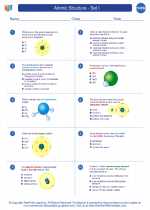Dispersal in Chemistry
Dispersal in chemistry refers to the process of spreading or distributing particles of a substance throughout another substance. This can occur in various forms, such as in a solution, a colloid, or a suspension.
Types of Dispersal
- Solution: A solution is a homogeneous mixture where one substance is dissolved in another. The particles of the solute are dispersed evenly throughout the solvent at the molecular level.
- Colloid: A colloid is a mixture in which one substance is dispersed evenly throughout another substance, but the particles are larger than those in a solution. Colloids often exhibit Tyndall effect, where they scatter light.
- Suspension: A suspension is a heterogeneous mixture in which fine particles of one substance are dispersed throughout another substance but settle out over time due to gravity.
Factors Affecting Dispersal
Several factors can affect the dispersal of particles in a substance:
- Temperature: Generally, an increase in temperature can increase the dispersal of particles as it provides more energy for the particles to move and spread out.
- Agitation: Stirring or shaking a mixture can increase dispersal by causing the particles to spread out more uniformly.
- Particle Size: Smaller particles tend to disperse more readily than larger particles, especially in solutions and colloids.
- Solubility: The solubility of a substance in a solvent can affect how readily it disperses in the solvent to form a solution.
Applications of Dispersal in Chemistry
Dispersal is a fundamental concept in chemistry and has numerous practical applications, including:
- Formulation of pharmaceuticals
- Preparation of colloidal suspensions for industrial processes
- Understanding the behavior of solutions in chemical reactions
- Development of new materials with specific dispersal properties
Study Guide
When studying dispersal in chemistry, it is important to understand the different types of dispersal (solution, colloid, suspension) and their characteristics. Additionally, familiarize yourself with the factors affecting dispersal and their impact on the behavior of particles in a substance. Be sure to explore real-world applications of dispersal in various industries to appreciate its significance in practical contexts.
Practice identifying examples of solutions, colloids, and suspensions, and consider conducting experiments or demonstrations to observe the effects of temperature, agitation, and particle size on dispersal.
By mastering the concept of dispersal, you'll be better equipped to understand a wide range of chemical phenomena and applications in the field of chemistry.
.◂Chemistry Worksheets and Study Guides High School. Atomic Structure - Set I

 Worksheet/Answer key
Worksheet/Answer key
 Worksheet/Answer key
Worksheet/Answer key
